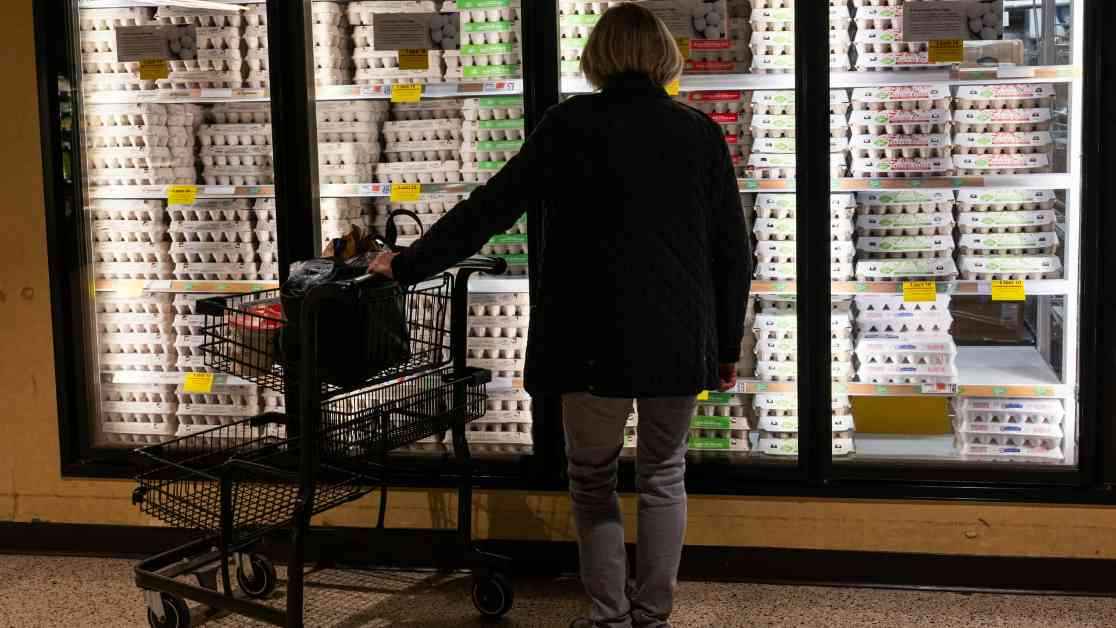Wholesale Egg Costs Plummet, Relief for Shoppers on the Horizon
In recent weeks, wholesale egg prices have taken a significant nosedive, offering a glimmer of hope for consumers who have been grappling with sky-high prices at grocery stores throughout the year. The drop in prices has been quite substantial, but the extent to which retail prices will decrease and how quickly this will happen remains uncertain, according to experts.
As of Friday, wholesale egg prices plummeted to $4.83 per dozen, marking a steep 44% decline from their peak of $8.58 per dozen on February 28. This change comes as a welcome surprise following a period of major bird flu outbreaks and weakened consumer demand that had previously sent prices soaring. The U.S. Department of Agriculture’s market analysis, published on Friday, attributed the decline to a combination of factors, including the absence of major bird flu outbreaks so far in March and a decrease in consumer demand, which has allowed the nation’s egg supply to slowly recover.
Karyn Rispoli, an egg market analyst and managing editor at Expana, described the drop in prices as a “plunge” and noted that market dynamics are exerting “extreme pressure” on wholesale prices to continue falling. Retail prices have also hit record highs, with consumers paying an average of $5.90 for a dozen large grade-A eggs in February. This figure represents a significant increase from previous years and has nearly doubled compared to prices from just a year ago.
The surge in prices was driven by a deadly bird flu outbreak in the U.S., which led to the death of millions of egg-laying chickens and severely impacted egg supply. In response to the crisis, the U.S. Department of Justice initiated an antitrust investigation into the pricing and supply practices of major egg producers. However, the recent tapering off of bird flu outbreaks in March has led to an improvement in supply availability, resulting in sharp declines in wholesale market prices over the past week, according to the USDA.
Consumers, faced with high prices and purchase restrictions imposed by many retailers, have scaled back their egg purchases, contributing to a reduction in supply shortages. Additionally, households stocked up on eggs out of fear that prices would continue to rise, mirroring the panic-buying behavior observed during the early days of the Covid-19 pandemic. As a result, there is currently no immediate urgency for consumers to replenish their egg supplies, as noted by Rispoli.
Despite early indications of price relief, experts caution that consumers may still feel the impact of peak market prices when purchasing eggs. There is typically a lag of two to three weeks between changes in wholesale costs and corresponding adjustments in retail pricing. Moreover, retailers have the autonomy to decide how closely they align their prices with wholesale rates, further influencing consumer spending.
Looking ahead, the upcoming Easter holiday, slated for April 20 this year, is expected to sustain high egg demand, potentially keeping prices at elevated levels. Kevin Bergquist, an egg analyst at the Wells Fargo Agri-Food Institute, anticipates that egg prices will remain volatile in the near future, although they are likely to stay above average levels in the short term.
As consumers navigate the fluctuating egg market, the prospect of relief on the horizon offers a glimmer of hope for those who have been impacted by soaring prices. While the full extent of the price decrease and its timeline remain uncertain, the gradual decline in wholesale egg prices signals a positive shift in the market that may soon translate into savings for shoppers.

























